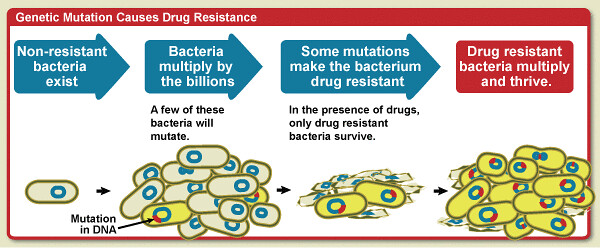Drugs
Drugs are defined as any substance taken into the body that modifies or affects chemical reactions in the body.
Medicinal drugs
Medical drugs are drugs used to prevent or treat diseases.
Antibiotics
Antibiotics are used in the treatment of bacterial infections. They work by specifically targeting certain bacterial features (such as cell walls) to kill them.
Viruses and other non-bacterial pathogens are unaffected by antibiotics as they do not have bacterial features.
Antibiotic resistance
Thanks to genetic mutation, simply by chance, some bacteria may be resistant to antibiotics.
If antibiotics are overused, then it will allow these resistant bacteria to survive and reproduce, leading to the rise of an entire strain with antibiotic resistance.
Antibiotic resistance is a good example of natural selection.
Antibiotics should therefore be used only when truly necessary, and the course of antibiotics given to the patient should always be fully completed before it is stopped.

Misused drugs
Some drugs are often misused, and some examples of this are:
- Alcohol
- Heroin
- Tobacco smoke
Alcohol and heroin misuse
Alcohol and heroin are depressants. When both of these drugs are used in excess the effects are similar:
- Slower reactions times
- Loss of self control
- Addiction and withdrawal
Moreover, alcohol can lead to liver damage and heroin can lead to STIs such as HIV due to needle sharing.
Tobacco smoke
Tobacco smoke contains a lot of bad chemicals and substances.
- Carbon monoxide – Binds to hemoglobin in RBCs and hinders oxygen transport
- Nicotine – Causes addiction
- Tar – Causes cancer
Smoking has been proven to be linked to chronic obstructive pulmonary disease (COPD), lung cancer, and coronary heart disease.
Testosterone in sports
Testosterone is an appealing drug for athletes because it promotes muscle building and can give the athlete faster recovery times.
Anabolic steroids are synthetic variations of testosterone.
In most sports, the use of testosterone is banned